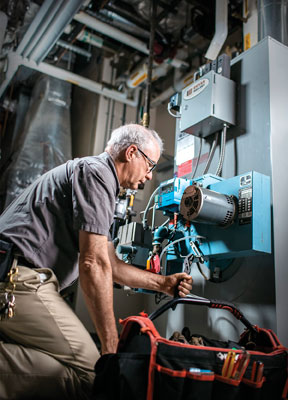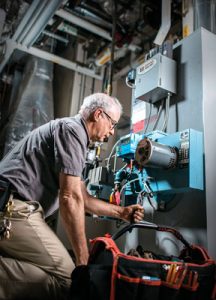
News
3 Propane Applications HVAC Contractors Should Have on Their Radar
By Jesse Marcus
The growing trend toward sustainable solutions in the residential building and remodeling industry is providing HVAC professionals with an opportunity to grow their business while helping customers find reliable, economical, indoor heating and cooling solutions.
 Customers often trust HVAC professionals to help them select the right system for their home. By understanding what’s available — and being able to decipher the best fit for each project — HVAC professionals can ensure customer satisfaction and grow their business.
Customers often trust HVAC professionals to help them select the right system for their home. By understanding what’s available — and being able to decipher the best fit for each project — HVAC professionals can ensure customer satisfaction and grow their business.
A wide range of residential propane applications provide homeowners with the ideal balance of performance and cost savings, while also giving HVAC professionals a unique offering and competitive advantage in the residential market.
High-efficiency propane furnaces, boilers, and hybrid heating systems, for example, offer considerable advantages over other units when it comes to efficiency, performance, and sustainability.
High-Efficiency Furnaces
Easily installed in any home, high-efficiency propane furnaces can provide space heating for any size floor plan from small residences to large custom homes. These systems offer best-in-class efficiency and many models deliver AFUE ratings of up to 98 percent. They are also more efficient and safer than traditional natural-draft furnaces because all of the air used for combustion is taken directly from the outdoors.
A high-efficiency propane furnace’s carbon footprint is smaller, too. Most notably, these units produce 60 percent fewer carbon emissions than electric heat pumps. This drastic difference in environmental performance is driven by the heat pump’s use of electric resistance back-up heating during times of cold ambient temperatures.
Hybrid Heating Systems
A hybrid heating system — sometimes called a “dual-fuel” system — combines an air-source heat pump (ASHP) or ground-source heat pump (GSHP) with a gas or propane furnace. They improve ASHP and GSHP performance by depending on a propane furnace, typically a high-efficiency unit, during colder winter periods.
Hybrid heating systems can protect homeowners from rising utility costs. In fact, a hybrid heating system comprised of an ASHP and a high-efficiency propane furnace can save nearly $400 per year compared with a standard efficiency ASHP-only system.
High-Efficiency Boilers
High-efficiency propane boilers offer efficiency, space savings, and the versatility to provide heating, hot water, and even snow melt. They are available in a wide range of heating capacities, with inputs reaching as high as 299,000 Btu/h. Many Energy Star rated propane boilers have efficiency ratings of at least 90 AFUE, and those ranked “Most Efficient” by the EPA offer up to 19 percent savings over standard efficiency units.
Some of the key features of high-efficiency propane boilers include electronic ignition, condensing operation, sealed combustion operation, modulation operation, and an outdoor reset.
Today’s homeowners are wanting smart, sustainable energy performance, and HVAC professionals should be considering propane solutions. Propane HVAC systems are known to be affordable, efficient, economical to operate, and kind to the environment. HVAC contractors who are well-versed in propane technology, and how it can impact a customer’s home, will be at an advantage.
Visit Propane.com to learn more about propane HVAC technologies.
Jesse Marcus is the director of residential and commercial business development at the Propane Education & Research Council. He can be reached at jesse.marcus@propane.com.














